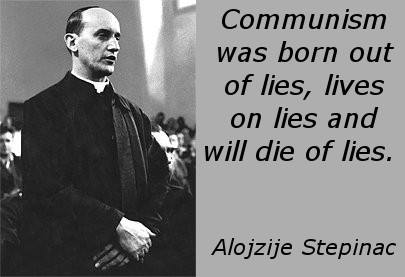During his period as coadjutor archbishop and as Archbishop of Zagreb up to the German-led Axis invasion of Yugoslavia in April 1941, Stepinac made his views clear on a number of political and religious issues. Foremost among these statements were those regarding Protestantism, Eastern orthodoxy, communism and Freemasonry.[22]
Stepinac criticized Protestantism, stating in a speech in 1938 that “the Catholic Church was the greatest civilising force in human history”,[22] but railed against those that wanted to deprive the Catholic Church of any influence in public life. He referred to the Reformation as the “Deformation”, and denounced Luther as a false prophet who “demolished the principles of legal authority given by the Lord”.[47] He went on to blame Protestantism for the “hell in which human society suffers today”,[47] and said that it had opened the road to “anarchy in all forms of human life.”[47] Stepinac was also highly critical of Eastern orthodoxy, seeing it as a serious danger to both the Catholic Church and Croats in general. The day after the Yugoslav coup d’état of 27 March 1941, he wrote in his diary:[47]
All in all, Croats and Serbs are two worlds, the north and south poles, which will never become close except by a miracle of God. The schism is the greatest curse of Europe, almost greater than Protestantism. In it there is no morality, no principle, no truth, no justice, no honesty.
On the same day he issued an encyclical to his clergy, calling on them to pray for the young king, and that Croatia and Yugoslavia would be “spared the horrors of war”. This was consistent with long-standing practice of the Catholic Church to show loyalty to the state and its leadership.[46]
Stepinac was well aware of the fact that an estimated 200,000 mostly Croatian Catholics had converted to the Serbian Orthodox Church in the interwar period. He later claimed that Catholics were forced to convert to Orthodoxy during the period between the wars, but according to the historian Jozo Tomasevich, the principal reason for their conversions was the pro-Serb public policy in the Serb-dominated Yugoslav state meant that it was advantageous both politically and for career prospects to be a member of the dominant religion.[48]Stepinac viewed the Yugoslav state as essentially anti-Catholic, particularly after the failure of the Yugoslav government to ratify the Concordat with the Vatican, which would have put the Catholic Church on a more equal footing with the Orthodox Church.[45] He was also sensitive to the fact that the Concordat had been vetoed in the Yugoslav parliament partly due to pressure exerted by the Serbian church.[49]
In 1940, Stepinac had told Prince Paul:[50]
The most ideal thing would be for the Serbs to return to the faith of their fathers, that is, to bow the head before Christ’s representative, the Holy Father. Then we could at last breathe in this part of Europe, for Byzantinism has played a frightful role in the history of this part of the world.”
Of all the threats he perceived to the Croatian people and the Catholic Church, Stepinac railed most against the dangers of communism. In August 1940, in response to the recent establishment of diplomatic relations between Yugoslavia and the Soviet Union, Stepinac sermonised that there could be no co-operation between the Church and communists, stated that the Church was not afraid of communists, and that communists would make Croatia “a nation of killers and robbers, debauchees, and thieves”.[47]
Stepinac was particularly obsessed with Freemasonry,[45] which was closely associated with the unity of Yugoslavia, and was opposed to the “authoritarianism and antiliberal ideology” of the Catholic Church.[51] In 1934 he wrote in his diary: “In Yugoslavia, today, Freemasonry rules. Unfortunately, in the heart of the Croatian nation also, in Zagreb, this hellish society has entrenched itself, a lair of immorality, corruption, and all kinds of dishonesty, the sworn enemy of the Catholic Church and therefore also of the Croatian nation. Without the knowledge and approval of the Freemasons, nobody can be appointed to any influential position. It is no joke to join battle with it, but it must be done in the interests of the church, the Croatian people, and even the state of Yugoslavia if it wants to continue to exist, because the violence that rules today is supported by Freemasonry.”[52]

Tomasevich observes that the highly critical views expressed by Stepinac on these matters were quite common among conservative senior churchmen prior to the Second Vatican Council in the early 1960s. He further claims that despite papal encyclicals against fascism in 1931, and Nazism in 1937, Stepinac never mentioned, criticised or condemned either of those political currents, noting that in 1938, the Catholic Church was supporting the same side as Italy and Germany in the Spanish Civil War, and public criticism of their political systems would not have been helpful. Finally, he states that the Vatican saw Germany as the most important opponent of communism.[51] Nevertheless, Stepinac was a member of the Yugoslav Catholic Bishops’ Conference that issued warnings against both Nazism and Communism after the 1937 papal encyclical against Nazism ideology.[45] Stepinac feared both Nazism and communism, and even distrusted western democracy. This can be seen from his diary entry of 5 November 1940, when he wrote, “If Germany wins [the war], there will be appalling terror and the destruction of little nations. If England wins, the masons, [and] Jews will remain in power… If the USSR wins, then the devil will have authority over both the world and hell.”[45]
 The Libertarian Catholic
The Libertarian Catholic















